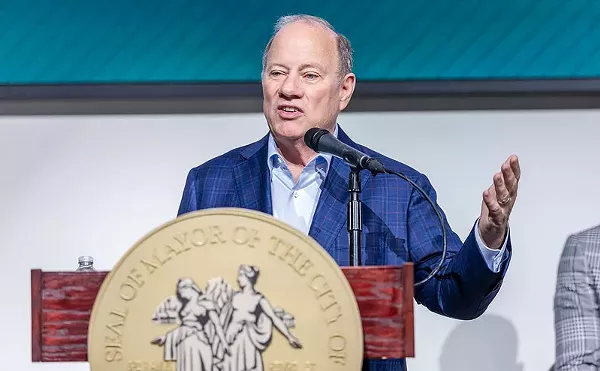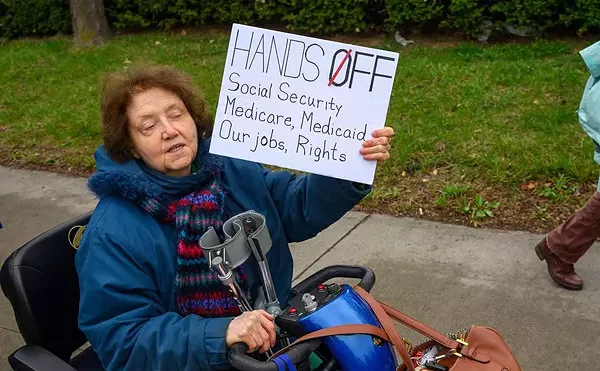
Audio By Carbonatix
[
{
"name": "GPT - Leaderboard - Inline - Content",
"component": "35519556",
"insertPoint": "5th",
"startingPoint": "3",
"requiredCountToDisplay": "3",
"maxInsertions": 100,
"adList": [
{
"adPreset": "LeaderboardInline"
}
]
}
]
Try as I might, I can’t manage to keep my mouth closed about issues going on here. So when a producer from Michigan Radio asked if I could talk about Nolan Finley’s “Where are the black people?” column from last Sunday’s Detroit News, I jumped at it – even though the most I had done with it was form some ragged thoughts in a Facebook status and a few tweets.
The catch: I’d had to talk about Finley’s column with Finley himself. No big, I told myself. Finley wants to know where the black people are, and me being a black person, I thought I was qualified to answer.
Radio interviews are either live or pre-taped, and done over the phone or in the studio. I’ve done some variation of all of those, but I’m by no means a seasoned vet. I give props to those who do work in radio, who flawlessly manage to keep dialogue flowing within certain time points. Even though I practice beforehand, which oddly means talking to myself in weird voice inflections, I sometimes end up a babbling mess when I get behind the mic.
And that’s when the pressure really began to set in. With the bankruptcy settled and the Bashara trial over, we’re back to having race as Detroit’s hottest topic – it’s the country’s hottest topic – and suddenly I’m having to represent my race, my people, my identity in a debate with Nolan Finley, a conservative white male whose ideals on race relations here are, at best, simplistic.
I’ve been uncomfortable with the fact that several writers, myself included, have questioned the status of black residents in Detroit’s renaissance for years, but Finley is being credited with “starting the conversation.” It’s truly unfair that when a white guy says there’s a problem with race in Detroit, not only does everyone listen, everyone expects him to lead the conversation.
But my beef has always been the media coverage of this revival; I could tick off a number of black-owned establishments in the CBD, yet as we see with The New York Times every time they visit, the stories written are clearly filed using Slows’ free wi-fi. Finally folks seem to be getting away from this, and rumor has it that Phil Cooley himself has been steering reporters away from Slows, but now the conversation has morphed into “why do black people complain so much about race in the first place when they’re not even a minority in the city?”
That’s the thing about “New Detroit,” isn’t it? Black people aren’t allowed to speak out about racism, and just be happy that some good things are happening in the city. What I planned to do was go on Michigan Radio and not only show Finley where he was wrong, but also emphasize why we should continue having such conversations.
It didn’t go as planned.
This conversation was going to be pre-taped for Michigan Radio’s “Stateside,” and we’d both call in from our phones. Ten minutes prior to my call-in, I asked on Facebook where the black people are. Silly question, yeah, except that I had my own list of haunts and Detroit is so big I wanted to make sure I left no stone unturned. There were places that usually have large black crowds (Flood’s, Cutter’s, PV Lounge, Centaur) and there was…everywhere else that had mixed crowds. The point was, there is literally nowhere in downtown Detroit, except maybe a synagogue, where you can’t find a black person. Or really, any person of color.
Is there an imbalance of white patrons at certain spots than others? Of course – depending on what day, what establishment, what the event is. Is it bad that there’s an imbalance? Let’s look at reasons why: Many places – D’Mongo’s comes to mind – attract curious suburbanites, mostly in Detroit for one night before scurrying back to the suburbs. Then you have places like Selden Standard, which just opened as a regional culinary destination, thus attracting a population that’s reflective of…the region. It’s no different than when Torino opened in Ferndale, or the Root in White Lake. And then you might have a place like Park Bar. If it’s gay night on Tuesday, you’re going to see a lot of older white guys. If some fake punk band is at the Fillmore, it’s going to be barely-21 white kids in raggedy black jeans drinking Bud Light. And any other night? Mixed crowd.
It would be impossible for Finley, a guy who thinks there’s nowhere to eat after 10 p.m. in Detroit, to deduce that blacks simply don’t exist in the CBD based on a few observations from the perch of wherever the News’ office is now. We all know as Detroiters that it takes time to inject yourself into the scene, which is why we get so pissed when travel writers sum up their experiences in a few paragraphs and ask questions like, “Why didn’t I see _________ when I was here?” And, frankly, for a middle-aged Livonian, I didn’t think it was fair for him to basically say that people like me are invisible.
I’m armed and ready for this conversation now. Our host, Cynthia Canty, leads with Finley, who explains the gist of his column. I don’t remember what he said verbatim. I do remember him talking about Punch Bowl Social, and that he was generally exasperated.
Canty cuts to me and asks whether I share Finley’s sentiments. Immediately, I ask “where is Nolan hanging out where he doesn’t see black people? I’ve got a list of places here…”
Finley interrupts. “Yeah, I know you’ve got your list, but the reality is, Aaron…” And about here is where I feel my face turning red. I’m being talked down to. I’m being put in my place by a white man. I can’t get my point across. I’m thrown off my game.
Mom always taught me not to interrupt people when they’re talking. But I couldn’t hold back – I’m representing the black people of Detroit here! So when I try to jump back into the conversation, Finley explodes.
“If you’re going to continue to interrupt me,” he says, “I’m going to walk away from this conversation and we’re done.”
He got the better of me again. “OK,” I said. But all I can think of is “he interrupted me!”
I am thinking in the back of my head that Canty will steer the conversation back to civil discourse. But my mind’s racing, and I can’t fully concentrate. “This poor woman is dealing with these two maniacal, egotistical writers fighting like dogs. How is this going to sound on the radio? Will I be invited on air again? Is my career dying at this very moment? What am I doing? What’s going on? Oh, God, oh, God, oh, God.” The list I had written in front of me turned to hieroglyphics.
I wanted to read out loud every place where the black people were and sum it up with the fact that you can’t go anywhere. But again, every time I spoke up, Finley cut me off, saying things like “the reality is…,” “my readers tell me…,” “when I go to these places...,”
(Maybe it’s possible black people haven’t heard of some of these developments downtown because the News doesn’t have as much reach as it did a decade ago? Just a thought.)
I noticed a few times he contradicted himself. There were times when he said, “Well, I actually have seen a few black people there, but…” So I tried to emphasize that, you know, Detroit is more than trendy restaurants. Ever been down the Grand River Creative Corridor? To the Natural Market?
And he kept interrupting. He asked where the black people were in Detroit, and refused to listen to a black person in Detroit answer the question.
The one thing we managed to agree on was the lack of access to entrepreneurial capital for minority-owned businesses, but I wanted to emphasize that minority-owned businesses outside the CBD matter just as much to Detroit as anywhere else. Still, the conversation ended all too abruptly, and I admittedly focused way too much on the goddamn restaurants. I tried my best to hit a home run in my final words. Canty asked if I knew what people were feeling outside the CBD. If I could, I would have said that it’s impossible to gauge the feeling of every single person, black or otherwise, about what’s going on downtown. All I could muster up was that I lived on the westside, and that when something new opens, people on the westside go to it.
The broad-brush painting of local and national writers, that downtown is a playground for wealthy white millenials and that literally every neighborhood outside of it is filled with illiterate, unemployed blacks is the tool Finley used for that column. It is just so simple to put everyone in those two boxes. Poor whites in, say, Downriver are never as scrutinized or gawked at as much as the impoverished black Detroiter, and wealthy residents of any race other than white are practically invisible. People love to scream about the black middle class residents that left Detroit – and there’s no denying that – but ignore those that stayed, as well as ignoring that black middle-class residents in all metropolitan areas sometimes find greener grass in their suburbs.
The nuance of Detroit, and Southeast Michigan as a whole, was gone. I kept wanting to scream “go down Livernois! Go to Springwells! Look at those neighborhoods there!” but I couldn’t. I wanted to read off addresses of my very black friends that live downtown, but they’d probably kill me for reading those on air.
The Detroit I’ve known has always had downtown and what we now know as Midtown as destinations. We had Mother’s Day dinners at Fishbones, proms at the RenCen, field trips to Second Baptist Church, touristy, fake-Vegas excursions in Greektown and concerts at the Masonic. You drive to these places to hang out and drive back to the neighborhoods to sleep. In your bed. In your house. I fully understand the concern of resources being poured into downtown and not being shared among neighborhoods that truly need it, and I’m critical of those ideals. But I don’t think those concerns should be conflated with making every single neighborhood look like Midtown, though. This is the concern-trolling that Finley and other writers are lost in, that neighborhoods like Midtown are somehow closed off to other residents because they don’t live there. Do people in New York City not travel between boroughs? Is there not a train going all through Chicago allowing its denizens to go from neighborhood to neighborhood?
But something so sticky, so complex, and so nuanced as race in Detroit tied to its current redevelopment can’t be boiled down in a ten-minute conversation on the radio. Maybe I’m not qualified to lead that discussion. But based on Finley’s reaction yesterday, he certainly isn’t.





